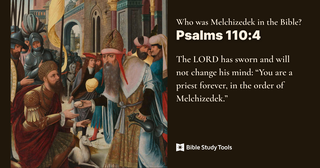- Recent Translations
- All Translations
Psalm 110:7
Share
Settings
Psalm 110:7 Meaning and Commentary
He shall drink of the brook in the way
This some understand of the sufferings of Christ, compared to a brook, a flow of waters, because of the abundance of them, as in ( Psalms 69:1 Psalms 69:9 ) , his partaking of which is sometimes expressed by drinking, ( Matthew 20:22 ) ( John 18:11 ) and this was in the way of working out the salvation of his people, and in his own way to glory, ( Luke 24:26 ) . If this is the sense, there may be some allusion to the black brook Kidron; over which David, the type of Christ, passed when in distress; and over which Christ himself went into the garden, where his sorrows began, ( 2 Samuel 15:23 ) ( John 18:1 ) , but seeing this clause stands surrounded with others, which only speak of his victories, triumph, and exaltation, it seems to require a sense agreeable to them; wherefore those interpreters seem nearer to the truth of the text, who explain it of Christ's victory over all enemies, sin, Satan, the world, and death; and illustrate it by the passage in ( Numbers 23:24 ) , "he shall drink of the blood of the slain"; with which compare ( Isaiah 63:1-3 ) . Others think the allusion is to the eagerness of a general pursuing a routed army, and pushing on his conquest; who, though almost choked with thirst, yet will not stop to refresh himself; but meeting with a brook or rivulet of water by the way, takes a draught of it, and hastens his pursuit of the enemy: and so this is expressive of, the eagerness of Christ to finish the great work of man's salvation, and the conquest of all his and their enemies; see ( Luke 2:49 ) ( 12:50 ) ( John 18:4-8 ) . But I think the clause is rather expressive of the solace, joy, and comfort, which Christ, as man, has in the presence of God, and at his right hand, having finished the work of our salvation; then he drank to his refreshment of the river of divine pleasure, when God showed him the path of life, and raised him from the dead, and gave him glory, and introduced him into his presence; where are fulness of joy, and pleasures for evermore, ( Psalms 16:11 ) .
Therefore shall he lift up the head;
as he did at his resurrection; he bowed it when he died, he lifted it up when he rose again, and so when he ascended on high to his God and Father; when he took his place at his right hand; where his head is lifted up above his enemies, and where he is exalted above angels, principalities, and powers, and where he must reign till all enemies are put under his feet. Or, "so shall he lift up his head", as Noldius F4 renders it; not that his sufferings, which he understands by "drinking out of the brook", were the cause of his exaltation, but the consequent of it: these two, Christ's humiliation and exaltation, though they are sometimes joined together, yet not as cause and effect, but as the antecedent and consequent; Christ having finished what, according to the divine order was to be finished, glory followed by the same order: and so the words thus taken respect not the cause, but the constitution of things, according to that writer.
F4 Concord. Ebr. Part. p. 727. No. 1941.
